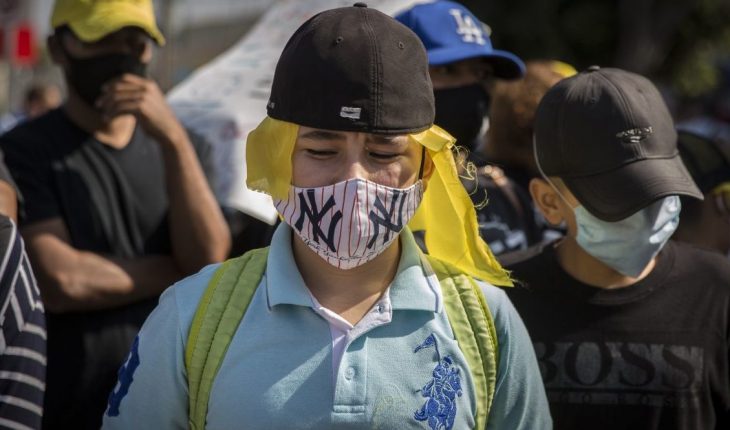Although the National Migration Institute (INM) has publicly denied coVID-19 contagions in its detention centres, the National Commission on Human Rights (CNDH) revealed that, in Tapachula’s 21st century migration station alone, Chiapas, there are at least 19 confirmed cases of Honduran nationality.
Just a week ago, the INM assured Animal Politics that cleaning and hygiene and health control actions are carried out at all its stations. However, the CNDH documented that the 21st century remains overcrowded, that healthy distance is not respected, no mouth covers are distributed, and that there is no antibacterial gel to prevent the spread of the virus.
The 19 confirmed cases of infected migrants have already been transferred from the 21st century station to the Provisional Stay called ‘El Hueyate’, located on the Huixtla-Tapachula road.
Read: Despite contagions, no COVID tests are performed on migrants, OSC reports; “we comply with measures,” says the INM
However, in the inspection carried out between 16 and 19 October, the visitors of the CNDH also detected numerous irregularities in these facilities. For example, there are no light and water services, hygiene conditions are bad, and most seriously: they detected women and girls in detention and had no apparent symptoms living with other infected migrants.
Faced with this situation, the CNDH issued a series of precautionary measures addressed to the COMMISSIONER of the INM, Francisco Garduño, so that the institute should immediately move migrants detained in the 21st century station “to a dignified stay”, to provide them with the food, health and hygiene services they require, “as well as healthy health spaces”.
He also asked the INM to provide “priority and urgent” medical care to covid 19 infected people who are detained in the interim ‘El Hueyate’ stay, paying special attention to children and adolescents.
Animal Politics consulted the INM again without receiving a response at the close of the edition. Today, the institution run by Francisco Garduño has not publicly acknowledged that cases have been detected inside its facilities, even though on September 11 the CNDH documented the death of a Salvadoran who was inside Mexico City’s immigration station and who was transferred to the hospital, where he died. On 6 August, the Institute even denied in a statement that there were COVID cases in its detention centres.
“Nice hotel in a great time”
These deficiencies documented by the CONDH confirm what was reported just a week ago, on 15 October, by multiple civil society organizations in the report ‘On the effects of the Covid 19 pandemic on migrants and refugees.’
“The impact on migrants and refugees by covid is something we have been warning and alerting for a long time,” Ana Saez, Director of Sin Fronteras, a civil organization that presented the report with the Foundation for Justice and the Democratic State of Rights, Asylum Access, and the Institute for Women in Migration (IMUMI), stressed in an interview , among others.
Saez recalled that, precisely because of the lousy conditions of health and overcrowding of migration stations, which have been widely documented in reports and in journalistic work, they had been going to the CNDH itself since last March, very much at the beginning of the pandemic, to the CNDH itself and to justice to order the INM to empty the detention centres.
However, although the Institute claims that it is complying with the recommendations of the CNDH and that it has emptied much of its stations, organizations such as Asylum Access reported on October 15 that the INM continues to make arrests of migrants, which it recruits at stations such as Villahermosa, in Tabasco, Iztapalapa, Mexico City, and the aforementioned 21st Century , in Chiapas.
“We hope that, in the face of new CNDH signals, the Mexican state will react and take steps to get these people released,” Ana Saez stressed.
No COVID testing
On Monday 26th, civilian migrant organizations are scheduled to meet with Hugo López Gatell, Under-Secretary of Health, and Alejandro Encinas, Under-Secretary for Human Rights, to present to them the results of the report on Covid 19 and detained migrants.
Among multiple points, the report states that the INM and no health authority regularly test Migrants detained at migrant stations regularly.
It is also noted that, at 35immigration statuses in the country, only two keep a daily record of the temperature of detainees, and that only one, saltillo’s, has a 24-hour medical service.
Read: Migrating under COVID laws: Train tracks were again the migrant route
As documented by the CNDH at Tapachula station, the Asylum Access organization also found that at the Las Agujas detention center in Mexico City, another of the largest and most important in the country, migrants are not provided with cover covers, or their delivery is very poor.
Alejandra Macías of Asylum Access said that on a visit last September to this station in the Mexican capital, the migrants interviewed reported that they were still using the same water cover that was provided to them by the U.S. immigration authority when they were arrested weeks ago.
A dead man in an INM protest and disobedience
The management of migration stations in the context of COVID-19 has generated strong criticism since the pandemic was declared. At first, the INM had to manage both the lockdown of the people its officials caught and those expelled by the United States through Title 42, a legal mechanism that allows Mexico to be returned to anyone trying to enter the U.S. country irregularly. All this with the borders of Guatemala, Honduras and El Salvador closed, which caused there to be times when these countries did not accept deportees. This led to dozens of migrants being abandoned on the border with Guatemala, where INM agents urged them to return home across the mountain.
Overcrowding and poor conditions inside detention centres provoked protests at least in Coahuila and Tabasco. The most serious took place on 31 March in Tenosique, Tabasco, where a fire was recorded in which a Guatemalan asylum seeker died. Hector Barrientos, 42, was three days away from being released and following his process outside the migrant station when he died. Lock-up comrades accused the guards of closing the door and preventing them from exiting.
From that incident the INM changed policy. During the month of April he devoted himself to emptying the stations, deporting when he could and delivering temporary residence cards in cases where expulsion was impossible. By the end of April, only a hundred migrants remained inside detention centres.
During all this time, civil society organizations submitted protections to guarantee the rights of enclosed migrants (who were released, that protocols to prevent COVID-19 be disclosed).
On several occasions the judges gave the reason to the activist groups and yet the INM ignored it. In August, for example, a court gave Commissioner Garduño himself an ultimatum: either he fulfilled the mandate to implement and ensure compliance with eleven Covid19 prevention measures within migration stations or he could be imprisoned. To this day, not one thing or the other has happened.
What we do at Animal Politics requires professional journalists, teamwork, dialogue with readers and something very important: independence. You can help us keep going. Be part of the team.
Subscribe to Animal Politics, receive benefits and support free journalism.#YoSoyAnimal
translated from Spanish: CNDH detects 19 COVID contagions in migrant centres; INM denied cases
October 24, 2020 |





